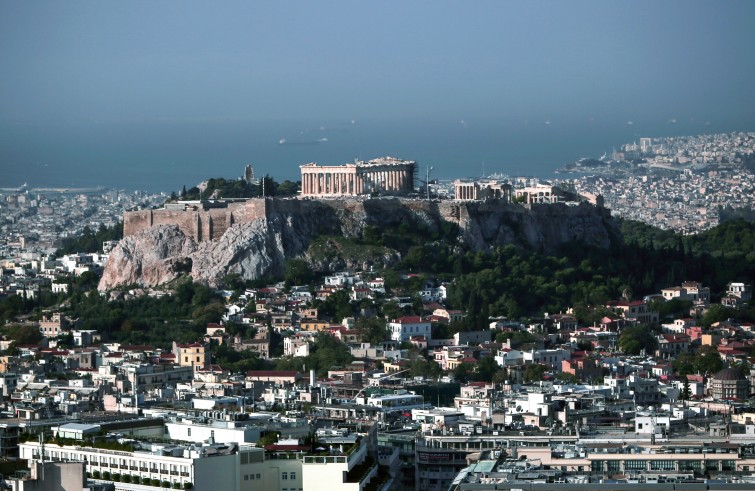
“This is a time of unity and solidarity. Europe cannot and must not ignore this. It must do its part, its history is at stake.” The words of Father Antonio Voutsinos, President of Caritas Greece, reflect all the efforts made by his Country and its 11 million inhabitants to recover from an economic and financial crisis that broke out in October 2009, which formally ended in August 2018, after three rescue packages worth over €325 billion granted by the Troika (EU, ECB and IMF).
“The Covid-19 pandemic threatens to nullify all efforts made so far”, the priest told SIR, “and above all the major sacrifices of the past years that offered a glimpse of hope for the future.”
Although scarred by an economic crisis, Greece is doing better than other countries faced by the Coronavirus emergency: as of 3 May, the Greek authorities confirmed 2,626 cases and 143 deaths from Covid-19. Infections are mainly recorded in the Patras region, Thessaloniki, the Chalkidiki Peninsula and Thrace.
 “The government took prompt action against the virus,” said Father Voutsinos. “Safety measures were taken early, thereby slowing down the spread of the virus, especially in the Greek islands where only residents are allowed to travel. These choices have also prevented the spread of the virus in refugee camps, at least until now. But we must not lower our guard.”
“The government took prompt action against the virus,” said Father Voutsinos. “Safety measures were taken early, thereby slowing down the spread of the virus, especially in the Greek islands where only residents are allowed to travel. These choices have also prevented the spread of the virus in refugee camps, at least until now. But we must not lower our guard.”
“An outbreak in refugee camps would be a catastrophe”.
Greece is home to some 100,000 asylum seekers with the highest number, exceeding 36,000, in the Aegean islands: Chios, Samos and Lesvos. The latter hosts over 20,000 people, 18,000 of whom in the Moria hotspot alone, that has a capacity of less than 3,000 people.
 Greek authorities are working in conjunction with the European Commission to prevent and tackle potential coronavirus outbreaks in the camps. The EU Civil Protection Mechanism has been activated with the request for housing, sanitation and medical equipment, including oxygen generators, X-ray machines and wheelchairs.
Greek authorities are working in conjunction with the European Commission to prevent and tackle potential coronavirus outbreaks in the camps. The EU Civil Protection Mechanism has been activated with the request for housing, sanitation and medical equipment, including oxygen generators, X-ray machines and wheelchairs.
Greece’s Phase 2. Starting today, May 4, protective masks are mandatory in supermarkets, taxis, hairdressers, hospitals, public transport and enclosed spaces (including lifts). Offenders will be fined €150. Individual outdoor sports are permitted. Small shops, bookshops, shops selling sporting goods, gardening, flowers, household appliances, eyewear and – by appointment only – hairdressers may reopen. The remaining retail shops are due to re-open on 11 May. In early June it will be the turn of entertainment and sports venues such as cinemas, theatres, gyms. All of them will have to guarantee social distancing and a maximum capacity of 60%. But it will all depend on the progress of the epidemiological curve.
Greek resilience. For the Caritas President Greece is better coping with the Coronavirus Covid-19 emergency, also thanks to
“the resilience of the Greek people, put to the test during the hard years of the financial crisis. We have all complied with the government’s restrictions from the beginning, deeming these sacrifices necessary, and not only inevitable.”
Needless to say, during the years of the crisis Greece underwent cuts in public spending of approximately 32%, with peaks of over 40% for health care spending. Thus Greece had only 560 intensive care units to cope with the pandemic, subsequently raised to 910. Hence, timeliness and resilience seem to be the trump cards of the Greeks faced by the Coronavirus. However, Fr. Voutsinos pointed out, it is feared that “the adverse repercussions of the virus on the economy will not be bearable for long.” According to financial estimates, the coronavirus epidemic will cost Greece three to five billion Euros a month. These figures will have to be revised upwards given that the tourism sector is unlikely to generate significant revenues next summer which, on the other hand, last year alone, accounted for over €18 billion, almost 20% of Greece’s GDP. “The coronavirus epidemic – said Stamatis Vlachos, director for social economy and solidarity programs of Caritas Greece – occurred precisely during the period of bookings for the next summer season.”
“Nowadays there is hardly a single tourism enterprise or project that hasn’t been forced to close down, as all bookings have been cancelled, and nobody knows when, and under which conditions, travel and tourism will be resumed. Already a whole year has been lost, not just a few weeks.”
Fear of a new recession. “The closure of so many businesses – affirmed Father Voutsinos – has resulted in thousands of job losses and a drop in consumption. The State is helping those who have lost their jobs with monthly 800 euro subsidies. These are significant amounts, for some even higher than the salary they received when they still had a job. But how are we going to pay back this money?” “I’m not an economist or financial analyst, I’m just a priest – said the president of Caritas – I don’t understand much about Eurobond, ESM, Recovery fund. But I know the sacrifices Europe will require of us. That is why I repeat:
This is the time of unity and solidarity.
Europe cannot and must not ignore this. It must do its part, its history is at stake.” “As Caritas – he added – we are endeavouring to ensure material support to the most vulnerable and underprivileged. We have not suspended our relief programs. We will continue as much as we can, but now more than ever we need a Europe that shows solidarity and unity when taking decisions.”









